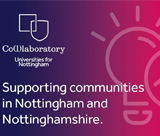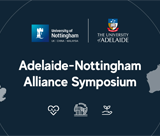
Bold drugs vision
March 11th, 2013
Chemists from The University of Nottingham are taking part in the biggest-ever European research programme to speed up the discovery of new drugs.
The scientists will be working with Sygnature Discovery in BioCity Nottingham as part of a new European Lead Factory — a collaboration between pharmaceutical giants, small and medium-sized enterprises (SMEs) and academic researchers. The project will bring €6.2m into the city.
BioCity Scotland in Lanarkshire will host the European Lead Factory screening centre and Joint European Compound Collection with a second screening centre in the Netherlands. This new facility will house a library of 300,000 compounds donated by pharmaceutical companies, with an additional 200,000 to be created by academics and SMEs including the universities of Nottingham and Leeds. It is the first time pioneering academic chemists will have access to synthetic production facilities of SMEs and the medicinal chemistry expertise of the pharmaceutical industry. This will allow the production of libraries of new molecules for screening against a whole raft of diseases.
To create new drugs the consortium will design hundreds of thousands of new molecules. The compounds will be synthesised by academic and SME-based scientists and then combined with collections from pharmaceutical companies. Compounds that are found to be ‘hit’ molecules — inhibit a disease target — will undergo further development.
Each new compound be screened against diseases including the world’s biggest killers, cancer, heart/lung disease and infections.
Dr Robert Stockman, Associate Professor and Reader of Organic Chemistry in Nottingham’s School of Chemistry, said: “This is a fantastic opportunity for academic chemists to pit their creativity against a wide range of therapeutic targets to further the potential of drug discovery. If this ‘grand experiment’ is successful, it will no doubt be the blueprint for a whole new collaborative approach towards the discovery of drugs.”
Dr Simon Hirst, from Sygnature Discovery, said: “The really exciting aspect of this project is the opportunity to discover novel drugs through the collaboration of seven international pharma companies and an open call to academics and industry across Europe.”
The €196m project is funded by the EU’s Innovative Medicines Initiative. It includes €80m funding from the European Commission’s Seventh Framework Programme for Research, and €91m from pharmaceutical firms AztraZeneca, UCB, Janssen, Lundbeck, Sanofi, Bayer, and Merck. The remaining €25m comes from the non-EFPIA members. Sygnature Discovery and four other chemical synthesis SMEs, 11 universities, including Nottingham, Leeds, Dundee and Oxford, and three other companies are also partners.
Tags: Associate Professor and Reader of Organic Chemistry, AztraZeneca, Bayer, BioCity, Dr Robert Stockman, Dr Simon Hirst, Janssen, Lundbeck, Merck., Sanofi, School of Chemistry, Seventh Framework Programme for Research, Sygnature Discovery, UCB
Leave a Reply
Other Research

Researchers and community partners needed to co-create research projects
The university is inviting people to participate in Co(l)laboratory’s next round of research project co-creation, which […]

Adelaide-Nottingham Alliance: join Vice-Chancellors at event celebrating global partnership
Staff, students and researchers are invited to join the Vice-Chancellors of the University of Nottingham and […]

